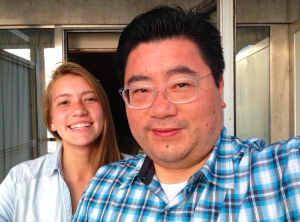It’s four in the morning. The sound of a phone ringing echoes through junior Maddy Peng’s room, waking her up. It’s her father calling from 6,000 miles away in Hong Kong,

China.
These calls have become routine for Peng and her father, David. It’s their way of staying close despite the distance between them.
For Peng and other students, having a long distance relationship with a parent or both parents has become a normal aspect of their lives.
Peng was born in Taiwan, and from there moved to Hong Kong at age three, followed by Shanghai at age six.
The long-distance relationship between David and his children, Maddy, Kris, and Denny, began in 2007. David and Peng’s mother Christina Burnet had just divorced and Burnet moved with all three children to Tiburon from Shanghai, China, while David stayed in Shanghai for his work. At the time, Peng was in fourth grade, Kris in seventh and Denny in ninth.
“I feel like it affected [my brothers] more because they had matured,” Peng said, adding that she thinks the fact that they are boys makes it harder to have a less involved paternal figure.
Now, Peng connects with her dad almost daily, whether through Facetime, talking on the phone, or WhatsApp, an application that is similar to texting, but uses wifi instead of cellular data, making it more internationally-friendly.
Between school and running for the track and cross country team, it can be hard for Peng to find time to talk.
“He contacts me, but a lot of times I’m super busy and can’t respond for a couple of days,” Maddy said “But over the weekend, we usually talk on the phone.”
The two also have to keep in mind the time differences between Hong Kong and California.
“He travels a lot so I forget where he is sometimes. I called him once at 3 a.m. his time thinking that it was 8 a.m. because he was in London but I thought he was in Hong Kong,” Peng said.
David typically visits Marin two to three times a year and Peng travels to visit him during summer and Christmas vacation.
In Shanghai, Peng attended an American international school. Speaking primarily in English there made her transition to California easier, but kept her from becoming fluent in Mandarin, like her parents and oldest brother are.
Peng plans to take a gap year after graduating in 2016 to travel through Asia so she can reconnect with her roots and become more familiar with Mandarin.
Senior Vicky Park is experiencing a similar situation to Peng, except that both of her parents have been living in South Korea since 2012.
Park, her sister Clare, mother N.S. and father Chanho moved to Marin in 2006 for Chanho’s work. They were originally planning to stay for three years but when Park’s father returned to Korea, N.S. and their daughters stayed in California because they felt they would not have been able to catch up to the rigor of the Korean schools.
However, living in America was hard for N.S.
“[My mother] wasn’t fluent in English. She isolated herself and started to show signs of depression,” Park said. “When I got my license, I told her to move back because I didn’t want her to suffer.”
In Sept. 2012, N.S. moved back to South Korea. Park’s sister had just started college at University of California, Berkeley. Park moved in with her friend’s family and has lived there for nearly two years.
Unlike Peng, Park is not in very frequent contact with her parents.
“It could be like once a week, sometimes its once every two or three weeks. It’s definitely not every day,” Park said.
They contact mostly through texting, but occasionally Facetime, typically on the weekends. The family is together once or twice a year, during winter break.
“Usually my sister and I travel to Korea because my dad has work,” Park said.






